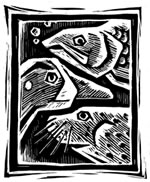- Home
- Restoration Projects
- Project Search
- LTM Program: Long-term killer whale monitoring 17120114-N
Project Information
Title: LTM Program: Long-term killer whale monitoring 17120114-N
Project Year and Number: 2017: 17120114-N
Other Fiscal Years and Numbers for this Project: 2024: 24120114-N, 2023: 23120114-N, 2022: 22120114-N , 2021: 21120114-N, 2020: 20120114-N, 2019: 19120114-N, 2018: 18120114-N, 2016: 16120114-M, 2015: 15120114-M, 2014: 14120114-M, 2013: 13120114-M, 2012: 12120114-M
Principal Investigator (PI): Craig Matkin (North Gulf Oceanic Society)
Managing Agency: NOAA
Assisting Personnel: None
Project Website: https://gulfwatchalaska.org/monitoring/pelagic-ecosystem/killer-whales/
Research Location: Prince William Sound, Kenai Fjords
Restoration Category: Monitoring
Injured Resources Addressed: Killer Whales
Abstract:The proposed project is a continuation of the photo-identification based long term killer whale monitoring program that was initiated in 1984 in Prince William Sound (PWS). A primary focus has been on resident killer whales and the recovery of AB pod and the threatened AT1 population of transient killer whales. These groups of whales suffered serious losses at the time of the oil spill and have not recovered at projected rates. Monitoring of all the major pods and their population dynamics, feeding ecology, movements, range, and contaminant levels will help determine their vulnerability to future perturbations and environmental change, including oil spills. The project uses various techniques, as possible and in addition to the core photoidentification monitoring and annual skin and biopsy sampling. These include observations of predation and sampling of prey, remote acoustic monitoring to identify important habitat and seasonal use patterns, time depth tags to investigate feeding ecology, and photographic drones to examine morphometrics, relocating whales for feeding studies. It continues examination of feeding habits prey sampling coupled with innovative chemical techniques. The study will continue to monitor delineate and monitor important habitat and variations in pod specific use patterns using observation as well as non-invasive remote acoustic monitoring. We will continue to examine the role of both fish eating and mammal eating killer whales in the near-shore ecosystem and their interaction with prey species. Community based initiatives, educational programs, and programs for tour boat operators will continue to be integrated into the work to help foster restoration by improving public understanding and reducing harassment of the whales.
Proposal: View (632 KB)
Reports:
Annual Report FY17: View (883 KB)
Final Report: See Project 21120114-N
Publications from this Project: None Available
